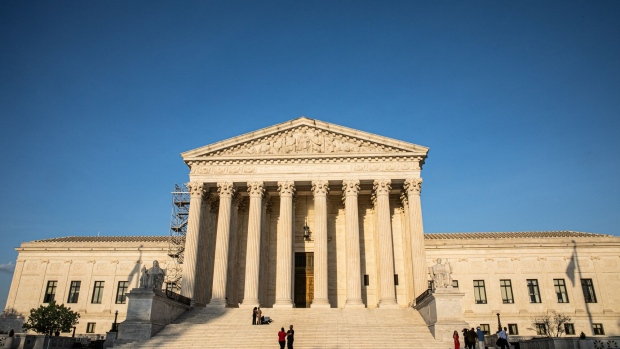Jan 16, 2024
Transgender Student Bathroom Case Rejected by Supreme Court
, Bloomberg News

(Bloomberg) -- The US Supreme Court refused to consider whether transgender students have a legal right to use school bathrooms that match their gender identity, sidestepping a clash at the heart of the nation’s culture wars.
The court Tuesday rejected an appeal from an Indiana school district sued by the family of a transgender middle school student who was barred from using the boys’ restroom. The rebuff, which came without comment or published dissent, leaves intact a federal appeals court ruling favoring the student.
At issue was the reach of the 1972 federal civil rights law that bars discrimination in schools on the basis of sex. The law has long been understood to allow for separate male and female bathrooms, but lower courts disagree as to whether schools can insist on classifying students according to the gender they were assigned at birth.
The case centered on a child, known in court papers only as A.C, who was born with female anatomy but has identified as a boy since about the age of eight. A.C. has been diagnosed with gender dysphoria and treated with puberty blockers, and Indiana courts have legally changed his name and the gender marker on his birth certificate.
After he enrolled as a seventh-grader at John R. Wooden Middle School in Martinsville in 2021, A.C.’s family requested that he be allowed to use the boys’ bathroom. The Metropolitan School District of Martinsville refused, requiring him to use either the girls’ bathroom or the single-user restroom in the school’s health office, which students can use with permission after signing in each time.
A.C. and his mother said in court papers that he grew angry, humiliated and depressed, and his grades suffered as a result.
Trump Shift
Transgender student bathroom rights have been a source of legal wrangling for years. The Supreme Court was scheduled to consider the subject in 2017, only to see the Trump administration scuttle the case by changing a key federal policy.
Martinsville officials said the 1972 law, known as Title IX, leaves room for schools to have separate bathrooms based on students’ “biological sex.”
“What Title IX does not do is impose a straightjacket on schools all throughout the country as they struggle to deal with an issue that is simply not what Title IX was enacted to address,” the school district argued.
A.C. and his mother urged the Supreme Court not to hear the case, saying the Chicago-based 7th US Circuit Court of Appeals correctly ruled that the school district probably violated Title IX. The 7th Circuit relied in part on the 2020 Supreme Court ruling that said transgender workers are protected under a federal law that bars job discrimination on the basis of sex.
That ruling “established that even if sex were narrowly understood as limited to sex designated at birth, discriminating against individuals based on their transgender status is still sex discrimination,” the family told the Supreme Court.
The case is Metropolitan School District v. A.C., 23-392.
(Adds details on case starting in third paragraph.)
©2024 Bloomberg L.P.


